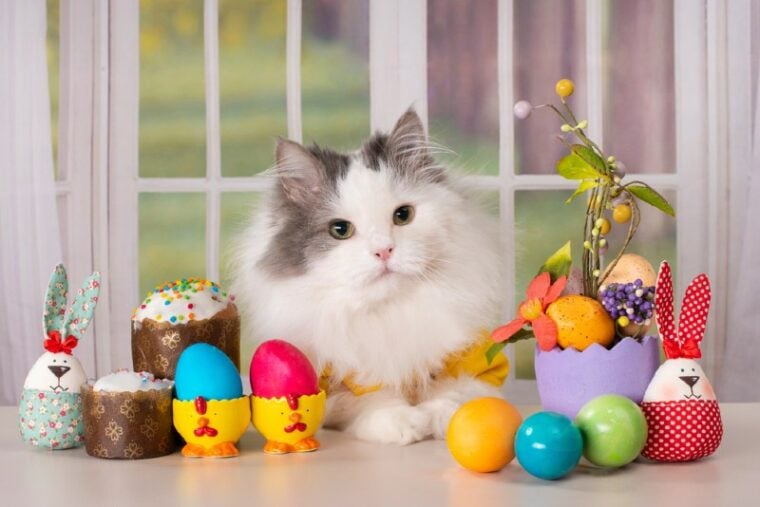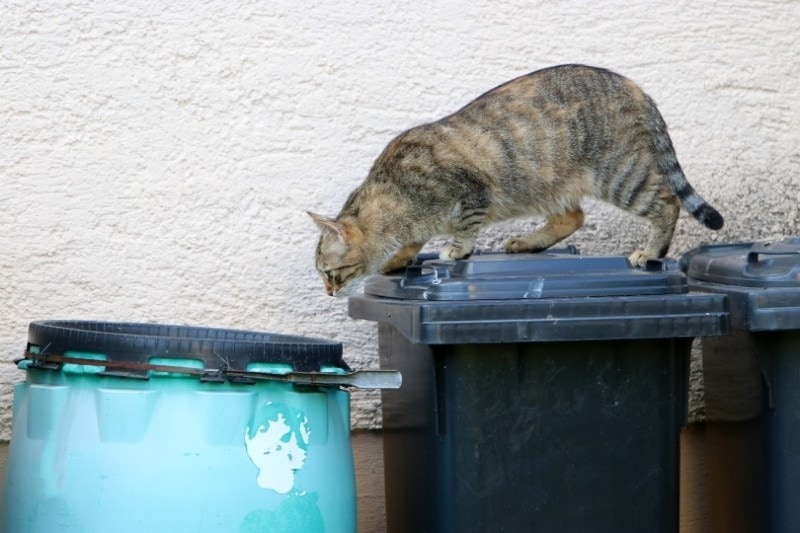
Easter is full of sweet chocolate treats, hidden goodies, and cute baby animals. While it might be great fun for the family, many of the sweets, decorations, and even party guests can pose a danger to your inquisitive cat.
They can eat the fake grass lining the baskets or suffer from poisoning from the innocent-looking Easter lily that you were gifted. Perhaps they ate too much human food during your holiday meal and got sick.
As a pet owner, keeping your cat safe during your holiday plans is of utmost importance. This list can help you make sure your Easter plans are as cat-friendly as possible without missing out on all the fun.
The 8 Easter Safety Tips for Cats
1. Avoid Table Scraps

When there’s food around, your cat will likely be close by too. Easter and many other holidays tend to involve a full-course meal with meat, vegetables, side dishes, and a variety of sweet desserts.
Unfortunately, most of the food that we cook for Easter contains ingredients that are toxic to cats1. The meat, for example, will likely be fatty, greasy, or even over-salted. If your cat eats too many of these types of foods, they can suffer from stomach ache, diarrhea, and even more serious conditions.
Onion and garlic1 are also common ingredients. Both are toxic to cats and dogs. Basically, table scraps are never a good idea. If you want to spoil your cat, stick with treats designed for them instead.
2. Create a Safe Spot
If you enjoy hosting parties for the holidays, you’re bound to have a few guests in your home. While it’s a time for you to catch up with your loved ones, your cat will likely be less than pleased with the strange invaders in their home.
Cats dislike interruptions to their routine. The sudden noise in a usually quiet house and the number of people around can make them feel unsafe and stressed. While some cats might be happy to find a new lap to sit on, others might be more skittish.
Make sure to give your cats a space to themselves while your guests are in your home. If you have over-excited children visiting, consider shutting your cat in a room they’ll be safe in.
3. Dispose of Twine & Bones

Cats are carnivores, so you might think that the meat part of your meal is safe for cats. This isn’t always the case. The twine and bones in certain meats pose dangerous risks for felines.
Twine gets soaked in juices and fat as the meat cooks. The added smell of meat coating the twine will increase your cat’s interest in the string. They might even try to eat the twine, which will lead to an expensive veterinary bill if it gets tangled in their digestive system.
Regarding bones, you’ll need to be careful around both dogs and cats. Cats might be less well known for gnawing on bones than dogs, but they’ll still steal them off the table to chew the scraps of meat. Unfortunately, cooked bones can splinter1 and get stuck in your cat’s throat or cause damage to their insides.
4. Do Not Keep Easter Lilies (They Are Toxic!)
Decorating for holidays is always fun, but not all holiday décor is safe for cats. Easter lilies can brighten up the home, but they’re also one of the most toxic plants for cats1. Easter lily toxicity can cause acute kidney failure and be fatal if not properly diagnosed and treated quickly.
While many toxic plants can simply be kept out of reach so your cat can’t eat them, the pollen of the Easter lily and other lily species is toxic too. This means your cat doesn’t need to eat it to suffer from poisoning; they can get the pollen on their fur and lick it off.
If you want to decorate your home for Easter, choose safer plant species or try plastic alternatives instead.
5. Keep Candy, Easter Eggs, & Toys Out of Reach

We all know how toxic chocolate1 is to dogs, but it’s true for cats too. The severity of your cat’s poisoning depends on the cat and the type of chocolate that they eat. However, any amount of chocolate is bad news for your cat and can cause low blood pressure, muscle tremors, seizures, and comas. It can even be fatal if not treated properly.
Easter eggs and toys are dangerous too. If your cat decides that fluffy bunny toy looks fun to play with, you’ll soon find them batting it around the floor and chewing on the ears. The problem is if your cat accidentally ingests a tag that wasn’t removed or one of the eyes that wasn’t secured properly. These objects can get trapped in your cat’s digestive system and require surgery to remove them.
Also, remember to keep track of the number of Easter eggs that you’ve hidden around the house, to make sure you collect the ones that weren’t found at the end of the day.
6. Know the Risks of Easter Grass
The candy and toys aren’t the only things that you should keep out of reach of your cat. Easter baskets are often decorated with basket grass. This plastic string-like décor comes in a variety of colors that can brighten your Easter basket or the cute scene that you’ve placed in the window.
Unfortunately, many cats love to chew on these plastic strings, and ingestion can cause vomiting, diarrhea, choking, or an emergency trip to the vet due to an obstruction.
The string can also get tangled up and might not pass through their system properly, leaving a string hanging out of their mouth or from their rear end. In either case, never pull the string1 unless it comes free easily. If you try to yank it out, it could cause damage to their internal organs.
7. Secure the Trash

With all the bones, fat, and other tantalizing food waste that will likely end up in the trash, you’ll need a way to keep your cat from tipping it over to steal the food. Either take the trash out as soon as possible or put something heavy on the lid that your cat can’t move.
Spraying the bin with citrus-scented Pine-Sol can help too. Cats hate citrus smells, and they’ll likely avoid the trash if it smells like lemons. Some stubborn felines might still be interested, though, so you should take other steps to ensure that they leave the bin alone.
8. Watch for Open Doors
If you have a house cat, keeping them inside while everything is going on can be a challenge. You might have guests arriving and then leaving after the celebrations are over or children running back and forth from the garden to the kitchen. Either way, your door will be open throughout the day, and curious felines are bound to be drawn to the intriguing outdoors — or get accidentally chased out by all the noise.
While having an open door doesn’t matter as much if you normally let your cat outside, for indoor cats, you’ll need to make sure they’re out of the way. You should also ensure that the door is closed whenever you’re not greeting guests, especially if you have children who forget to close it while playing.
What Spring Flowers Are Safe for Cats?
Easter lilies are incredibly dangerous, and other Easter-themed plants are toxic too. All lilies are best avoided when it comes to cats, along with cyclamen and amaryllis, which are also used for Easter decorations.
Fortunately, there are various plants that you can use to decorate for Easter even if you own a cat. Here are safe alternatives1 to try:
This list isn’t all-inclusive, and there are plenty of other plants that are safe for cats. Ask your veterinarian which flowers you can keep in your home for the Easter season if you’re unsure.
Final Thoughts
For your cat, Easter means brightly colored toys and enticing meaty smells from your dinner. Unfortunately, it’s not always the most cat-friendly holiday, and it’s up to us as cat owners to protect our felines. Take note of these safety tips — and keep the Easter lilies out of the house entirely — to make sure your celebrations are as safe as possible for your inquisitive cat. That way, your furry feline can join in the fun too.
Featured Image Credit: kuban_girl, Shutterstock








